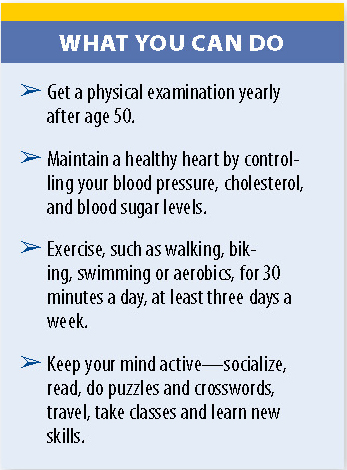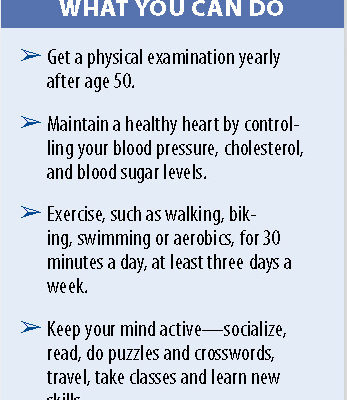Steps to Help You Deal with Mild Cognitive Impairment
Contrary to popular belief, memory loss is not a natural part of aging. Occasionally forgetting a name or misplacing the car keys is normal. But significant memory problems that disrupt daily life, such as getting lost on the way home from a familiar grocery store or developing an inability to keep track of bills, may be early symptoms of dementia.
 “Dementia is an umbrella term for cognitive impairments, and patients need to have impaired activities of daily living to have the diagnosis,” says Ming Guo, MD, PhD, a neurologist at UCLA Health System. Some early signs of dementia may include difficulty remembering names and recent events, apathy, and depression.
“Dementia is an umbrella term for cognitive impairments, and patients need to have impaired activities of daily living to have the diagnosis,” says Ming Guo, MD, PhD, a neurologist at UCLA Health System. Some early signs of dementia may include difficulty remembering names and recent events, apathy, and depression.
Mild cognitive impairment (MCI) is an intermediate stage between the expected cognitive decline of normal aging and the more serious decline of dementia. MCI affects 10 to 15 percent of adults over the age of 65. The only known risk factor is age. About 10 percent of people with MCI will develop dementia.
“Early-onset dementia refers to having developed dementia before the age of 65,” Dr. Guo says. “Early-onset Alzheimer’s patients may have familial causes—mutations in certain genes.”
Steps you can take to improve your memory. If you suspect that you may have MCI or dementia, visit your doctor right away for an official diagnosis. If you do have problems with your memory, there are some tips you can try to improve your quality of life. These include:
✓ Carry a small tablet or notebook and write down names of people you meet, directions, or key points during a conversation or when listening to a speaker.
✓ Make a list to help you compensate for memory lapses. Grocery lists, to-do lists, lists of the names of people you might see during a given day, and lists of frequently-used telephone numbers are a start.
✓ Take a cell phone photo of a parking space, a sign in a yard or business place, an item borrowed or loaned, or a favorite restaurant.
✓ Use calendars as interactive devices for recording appointments, meetings, birthdays, and other events.
✓ Set kitchen timers or alarms in watches and automobiles to remind you to take medication, check your mail or email, turn the stove or oven on or off, or do other tasks you may have difficulty remembering.
✓ When not in use, put commonly misplaced items in a specific place at home—car keys and wallet on a specific dresser or counter, glasses where you use them while reading, hearing aids in a carrying case, cell phones near landline phones.
✓ Ask a family member or friend to help you remember important dates, names, places, and events. Ask someone to accompany you when you go to the doctor so that person can help you remember instructions.
The bottom line. “Eating healthy, physical and mental exercise, and participating in social activities may help slow the progression of dementia,” Dr. Guo advises. “Establishing a correct diagnosis is one of the most important aspects of managing the illness, as not all memory problems are due to dementia, and not all dementia is due to Alzheimer’s disease.”
The post Steps to Help You Deal with Mild Cognitive Impairment appeared first on University Health News.
Read Original Article: Steps to Help You Deal with Mild Cognitive Impairment »
Powered by WPeMatico


